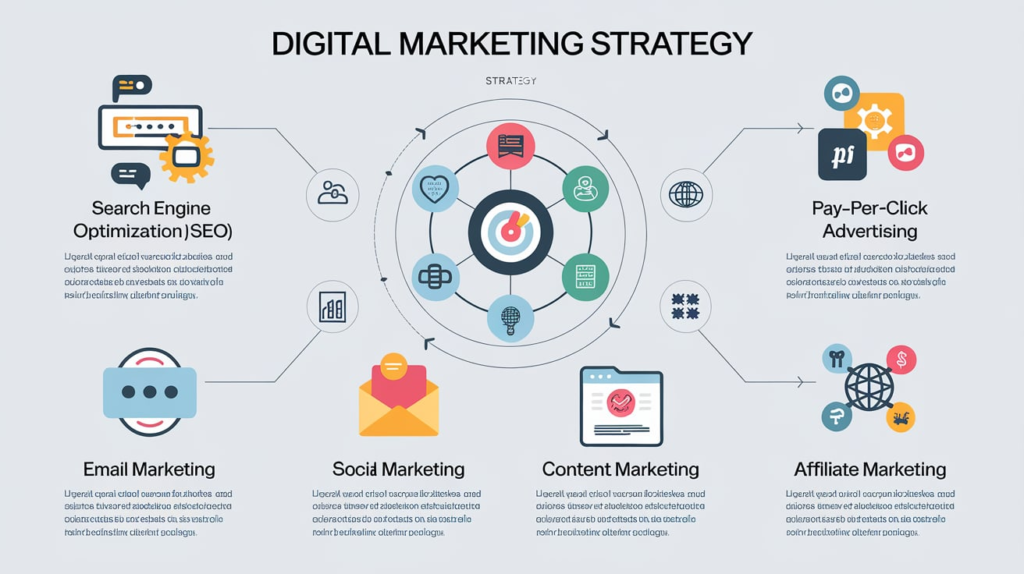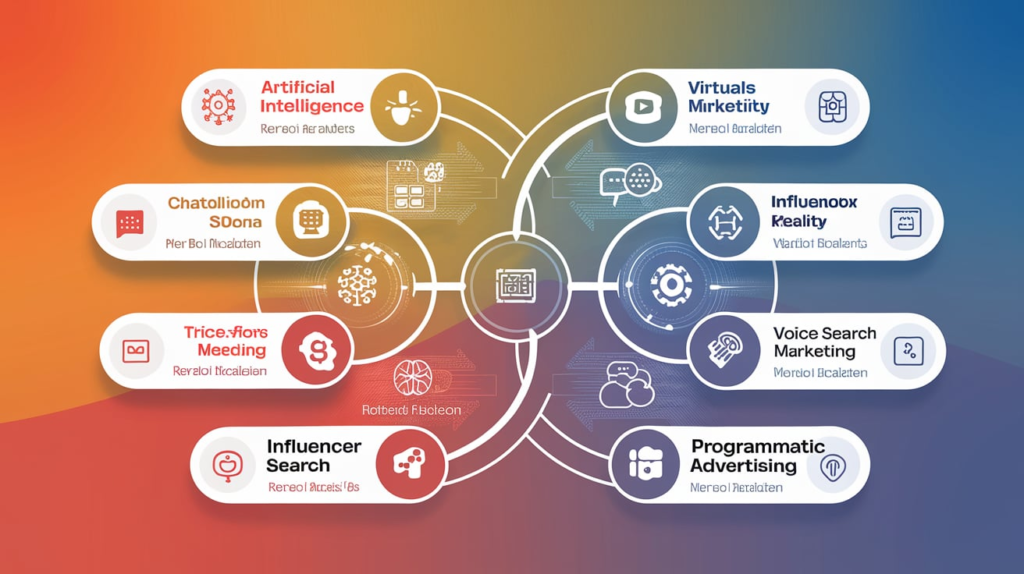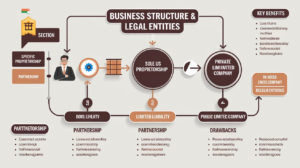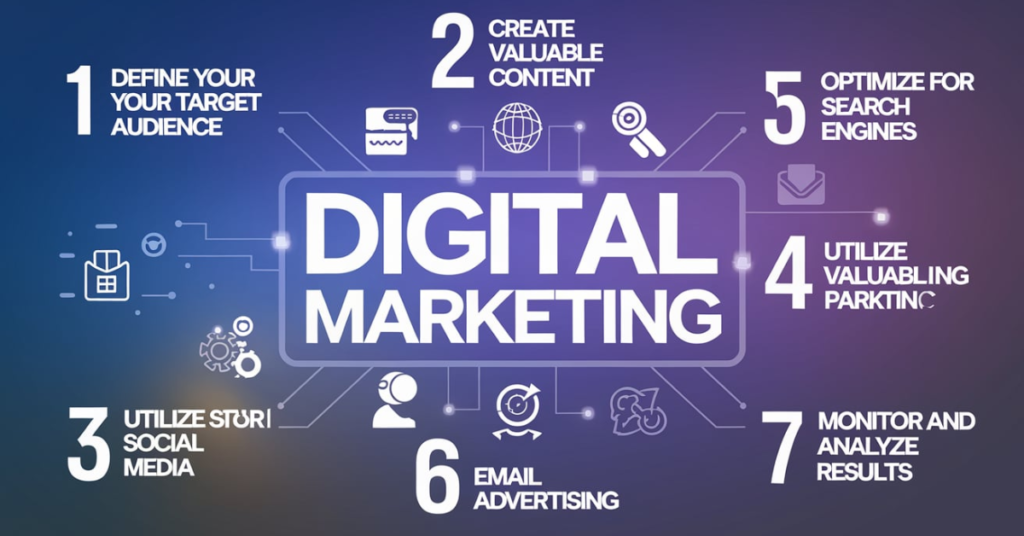In today’s hyper-connected world, digital marketing has become an essential component for businesses of all sizes. It encompasses a wide array of online marketing techniques and strategies aimed at reaching consumers through various digital channels. This article will explore the various facets of digital marketing, including its key strategies, current trends, challenges, and the future landscape.
What is Digital Marketing?
Digital marketing refers to any marketing efforts that utilize the internet or electronic devices. It includes a variety of channels and strategies, such as:
- Search Engine Optimization (SEO): The process of optimizing your website to rank higher in search engine results.
- Content Marketing: Creating and distributing valuable content to attract and engage a target audience.
- Social Media Marketing: Utilizing social media platforms to promote products and interact with consumers.
- Email Marketing: Sending targeted emails to nurture leads and engage customers.
- Pay-Per-Click (PPC) Advertising: Paying for ads to appear on search engines and other platforms.
- Affiliate Marketing: Partnering with individuals or organizations to promote your products for a commission.
Importance of Digital Marketing
1. Global Reach
Digital marketing transcends geographical boundaries. Businesses can reach a global audience with relative ease, allowing for expanded market potential. With over 4.5 billion internet users worldwide, the potential for growth is enormous.
2. Cost-Effectiveness
Compared to traditional marketing methods, digital marketing is often more cost-effective. Small businesses, in particular, can benefit from affordable online advertising and the ability to reach targeted audiences without breaking the bank.
3. Measurable Results
Digital marketing provides tools for tracking and analyzing campaigns in real time. Marketers can measure engagement, conversion rates, and ROI, enabling them to make data-driven decisions to optimize their strategies.
4. Improved Customer Engagement
Digital marketing allows for direct communication with consumers. Social media, email marketing, and personalized content enhance engagement and foster a sense of community around a brand.
5. Enhanced Brand Awareness
Through various digital channels, brands can build a strong online presence. SEO, content marketing, and social media efforts contribute to greater visibility, helping businesses establish authority and credibility in their industries.
Key Strategies in Digital Marketing

1. Search Engine Optimization (SEO)
SEO is a foundational element of digital marketing. It involves optimizing website content, improving site architecture, and increasing the quality of backlinks to boost search engine rankings. Key aspects of SEO include:
- Keyword Research: Identifying relevant keywords and phrases that potential customers are searching for.
- On-Page SEO: Optimizing individual web pages to rank higher, including title tags, meta descriptions, and content.
- Off-Page SEO: Building authority through backlinks and social signals.
2. Content Marketing
Content marketing focuses on creating valuable, relevant content to attract and engage a target audience. This includes blogs, videos, podcasts, infographics, and more. Effective content marketing strategies involve:
- Understanding Your Audience: Knowing their pain points and interests to create tailored content.
- Consistency: Regularly publishing content to keep the audience engaged.
- Promotion: Sharing content through social media and email marketing to reach a wider audience.
3. Social Media Marketing
Social media platforms provide an excellent opportunity for brands to connect with their audience. Popular platforms include Facebook, Instagram, Twitter, LinkedIn, and TikTok. Key strategies for effective social media marketing include:
- Content Creation: Posting engaging and relevant content that resonates with the audience.
- Community Engagement: Interacting with followers through comments, messages, and discussions.
- Advertising: Using paid advertising options to boost visibility and reach specific demographics.
4. Email Marketing
Email marketing remains one of the most effective digital marketing strategies. It allows businesses to communicate directly with customers and leads. Best practices for email marketing include:
- Segmentation: Dividing your email list into specific groups based on behavior, interests, or demographics.
- Personalization: Tailoring content and offers to individual recipients to enhance engagement.
- Automation: Using tools to automate email campaigns, saving time while maintaining consistency.
5. Pay-Per-Click (PPC) Advertising
PPC advertising allows businesses to pay for ads that appear in search engine results or on social media platforms. Advertisers only pay when someone clicks on their ad. Key components of a successful PPC campaign include:
- Keyword Selection: Choosing the right keywords that align with your target audience’s search intent.
- Ad Copy: Crafting compelling ad copy that encourages clicks.
- Landing Page Optimization: Ensuring that the landing page is relevant to the ad and provides a seamless user experience.
6. Affiliate Marketing
Affiliate marketing involves partnering with affiliates to promote your products in exchange for a commission on sales generated through their efforts. This strategy can be highly effective for reaching new audiences. Successful affiliate marketing requires:
- Choosing the Right Affiliates: Collaborating with individuals or brands that align with your values and audience.
- Clear Commission Structures: Providing clear guidelines on how commissions are earned and paid.
- Tracking Performance: Using tools to monitor affiliate performance and adjust strategies accordingly.
Current Trends in Digital Marketing

As technology evolves, so do the strategies and tools used in digital marketing. Here are some current trends shaping the landscape:
1. Increased Focus on Video Marketing
Video content is becoming increasingly popular, with platforms like TikTok and YouTube leading the way. Marketers are using video to engage audiences, demonstrate products, and share brand stories. Live streaming and short-form videos are particularly effective for capturing attention.
2. Personalization and Targeting
Consumers expect personalized experiences tailored to their preferences and behaviors. Utilizing data analytics and AI, marketers can create targeted campaigns that resonate with individual consumers, leading to higher engagement and conversion rates.
3. Voice Search Optimization
With the rise of voice-activated devices, optimizing for voice search is becoming essential. Marketers are adjusting their SEO strategies to include conversational keywords and phrases that people use when speaking.
4. Sustainability and Social Responsibility
Consumers are increasingly prioritizing brands that demonstrate social responsibility and sustainability. Digital marketing campaigns that highlight a brand’s commitment to ethical practices can attract and retain environmentally conscious customers.
5. Artificial Intelligence and Automation
AI and machine learning are revolutionizing digital marketing. From chatbots providing customer service to algorithms optimizing ad campaigns, these technologies enhance efficiency and effectiveness, allowing marketers to focus on strategic planning.
6. Data Privacy and Security
As concerns about data privacy grow, businesses must prioritize transparency and security in their digital marketing efforts. Complying with regulations such as GDPR and CCPA is crucial for maintaining consumer trust.
Challenges in Digital Marketing
While digital marketing offers numerous benefits, it also presents challenges that marketers must navigate:
1. Constantly Changing Algorithms
Search engines and social media platforms frequently update their algorithms, impacting visibility and reach. Staying updated on these changes is essential for maintaining a successful digital marketing strategy.
2. Competition
The digital landscape is crowded, making it challenging for brands to stand out. Differentiating your brand and offering unique value propositions is crucial for capturing attention.
3. Ad Fatigue
Consumers are exposed to a constant stream of ads, leading to ad fatigue. Marketers must find innovative ways to engage audiences without overwhelming them.
4. Managing Multiple Channels
With various digital marketing channels available, managing and integrating campaigns can be complex. Marketers must develop cohesive strategies that align across all platforms.
5. Keeping Up with Technology
As technology continues to evolve, marketers must stay informed about new tools and trends. This requires ongoing education and adaptability to leverage the latest advancements effectively.
The Future of Digital Marketing
Looking ahead, digital marketing will continue to evolve, influenced by technological advancements and changing consumer behaviors. Here are some predictions for the future:
1. Increased Use of Augmented Reality (AR)
AR technology is gaining traction, providing immersive experiences for consumers. Brands will increasingly leverage AR for product demonstrations and interactive marketing campaigns.
2. Continued Growth of Influencer Marketing
Influencer marketing is expected to expand as brands seek authentic connections with consumers. Micro and nano influencers, who have smaller but highly engaged audiences, may become more sought after.
3. Greater Emphasis on User-Generated Content (UGC)
User-generated content fosters community and authenticity. Brands will increasingly encourage customers to share their experiences, creating a sense of belonging and trust.
4. More Focus on Customer Experience
As competition intensifies, providing exceptional customer experiences will be paramount. Brands that prioritize customer service and engagement will differentiate themselves in the market.
5. Evolution of Voice and Visual Search
Voice and visual search will continue to grow, prompting marketers to adapt their strategies. Optimizing for these search methods will become essential for maintaining visibility.
Conclusion
Digital marketing is an ever-evolving field that presents both opportunities and challenges for businesses. By embracing innovative strategies, staying informed about trends, and prioritizing customer engagement, brands can effectively navigate the digital landscape. As technology continues to advance, the future of digital marketing promises exciting possibilities for those willing to adapt and grow. Whether you’re a small startup or a large corporation, harnessing the power of digital marketing is crucial for success in the modern marketplace.









3 Comments
Pingback: Social Media Marketing - Urban Vibe Mag
Pingback: Remote Work - Urban Vibe Mag
Pingback: AMC Stock Analysis and Forecast - Urban Vibe Mag